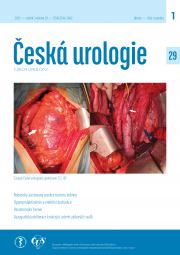Ces Urol 2001, 5(2):27-29 | DOI: 10.48095/cccu2001016
Urologic complications of nephrogenous diabetes insipidus
- Urologická klinika LF UK a FN Plzeň
Congenital nephrogenous diabetes insipidus (CNDI) develops from hereditary insensitivity of distal tubular cells to antidiuretic hormone. Severe forms with diuresis up to 10 litres per day can extend beyond the transport capacity of urinary tract with resulting urologie complications.
Authors present a case of 37-year-old male with CNDI and daily diuresis of 10 litres. Patient had a history of acute surgery for urinous peritonitis after rupture of megavesica following abdominal trauma at 16 years of age. Bilateral megaureters were also diagnosed, but the values of creatinin clearance and serum creatinin (SC) gave normal results that time. During two years follow up megavesica, large postmicture residuum and megaureters were persistent, renal functions slowly declined (SK rose above 206 mmol/l), twice repeated rupture of vesica was treated conservatively. Patient has not been attending further urologie controls. Urologie care started again in his 37 years, when the findings on urotract were similar and SK rose on 477 mmol/1. Urodynamic examination diagnosed a high capacity low tension bladder with large residuum. A pure intermittent self-cathetrisation 6-10 times daily was introduced, megaureters diminished, but SK values remained above 400 mmol/l in consequence from advanced nephropathy.
Severe form of NDI leads to extension beyond the transport capacity of urotract, the locus minoris of our patient was urinary bladder. Dilated urinary tract is susceptible to traumas when not treated and renal functions are gradually irreversible destroyed. Therefore an appropriate urine derivation has to be considered soon (pure intermittent cathetrisation, epicystostomy, punction nephrostomy).
Keywords: Nephrogenous diabetes insipidus, Urologie complications, Mega ureters, Megavesica, Renal insufficiency, Self-cathetrisation
Published: March 1, 2001
References
- Bichet DG: Nephrogenic diabetes insipidus, Am J Med, 198, 105: s. 431-442.
- Hanuą T: Dysfunkce dolních močových cest, In: Dvořáček, J. a kol.: Urologie, ISV, Praha, 1998: s. 1307-1333.
- Hanuą T: Intermitentní katetrizace močového měchýře, Čas. Lék. Čes., 1983, 122: s. 1135-1137.
- Van Lieburg AF, Knoers NVAM, Monnens LAH.: Clinical Presentation and follow-up of 30 patients with congenital nephrogenic diabetes insipidus, J Am Soc Nephrol, 1999, 10: s. 1958-1964.
 Go to original source...
Go to original source...  Go to PubMed...
Go to PubMed... - Nakada T, Miyauchi T, Sumiya H, Shimazaki J: Nonobstructive urinary tract dilatation in nephrogenic diabetes insipidus, Int J Urol Nephrol, 1990, 22: s. 419-427.
 Go to original source...
Go to original source...  Go to PubMed...
Go to PubMed... - Tekgül S, Öge Ö, Şimşek E, Yordam N, Kendi S: Urological manifestation of the Wolfram syndrome: observations in 14 patients, J Urol, 1999, 161: s. 616-617.
 Go to original source...
Go to original source...  Go to PubMed...
Go to PubMed... - Ten Bensel RW, Peters ER: Progressive hydronephrosis, hydroureter, and dilatation of the bladder in siblings with nephrogenic diabetes insipidus, J Pediatr, 1970, 77: s. 439-443.
 Go to original source...
Go to original source...  Go to PubMed...
Go to PubMed... - Uribarri J., Kasaks M: Hereditary nephrogenic diabetes insipidus and bilateral nonobstructive hydronephrosis, Nephron, 1993, 65: s. 346-349.
 Go to original source...
Go to original source...  Go to PubMed...
Go to PubMed... - Zender HO, Ruedin P, Moser F, Bolle JF, Leski M: Traumatic rupture of the urinary tract in a patient presenting nephrogenic diabetes insipidus associated with hydronephrosis and chronic renal failure: case report and review of the literature, Clin Nephrol, 1992, 38: s. 196-202.


